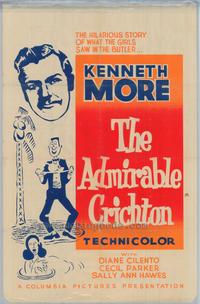
THE ADMIRABLE CRICHTON
UK, 1957, 93 minutes, Colour.
Kenneth More, Diane Cilento, Cecil Parker, Sally Ann Howes, Martita Hunt.
Directed by Lewis Gilbert.
The Admirable Crichton is from a play by J. M. Barrie. Barrie had been popular with films in the thirties with The Little Minister, Quality Street and so on. This is an enjoyable version of Barrie's play and the reversal of roles and the study of class distinctions when people are stranded on an island The American version was called Paradise Lagoon. Attractively filmed in colour, boasting enjoyable performances by Kenneth More and Cecil Parker, this film is light comedy but also has many serious satiric overtones and parody of English society. It would repay discussing.
1. How enjoyable a comedy? How wise a comedy?
2. The British style and techniques, the use of colour, locations, comedy techniques?
3. Was it evident that the film was based on a play? How well was it adapted?
4. The picture of the early Twentieth Century, how has it changed over the succeeding decades? Has the impact of this play changed over the decades? Does it seem too dated now?
5. The picture of Lome Hall: the aristocracy, their style of life, the manners and attitudes of the family, the daughters and their snobbery, the father and his equalizing tendencies, the suffragette background etc.? How interesting a commentary on English style at the turn of the century?
6. What insight into the questions of class, snobbery, equal rights for women etc.? which incidents visualised this best?
7. Crichton himself as a snob? The significance of the opening and the preparation of the breakfast for Lord Lome? Crichton and his advice to Lord Lome and to the daughters? Crichton's horror at the equal afternoon tea for the servants? What kind of person was Crichton? A character, a type?
8. The dramatic impact of the wreck, survival? The comedy of the initial ineptitude at the survival? Crichton and Eliza as being capable, the others as being incapable, Lady Mary and her stubbornness?
9. How well did the film show the change of roles? The adaptation of the upper classes to the outdoor life and to work? Crichton and his ability for decisions? The change in the character of each? Lord Lome coming alive and serving the governor, Lady Mary and her vigour (after her initial 'standing off', yet her attraction for Crichton)? The girls and their fiances and their learning how to do things, the men and their attitude towards Tweeny?
10. Comment on the detail of the effect of the life on the island on each of them?
11. How were they humanized? How did they seem alive even though they were thought to be dead (the irony of the memorial service and statue?)
12. The importance of theory and practice about snobbery, class distinctions, manners? The irony of Crichton being waited on by Lord Lome? The reference of everyone to 'The Governor'? Trying to please him? The anniversary celebrations? The proposals and the preparation for marriage? The idyllic nature of their life? (Paradise Lagoon)
13. The theorizing about the rescue and whether they would be rescued or not? Whether they wanted to be or not? The dramatic emphasis that the rescue came during the wedding ceremony? The facing of reality? The eagerness of Lord Lome and Tweeny?
14. Audience response to the reversal on the return home? The effect on each of them? The lies and the dimming of the memories? The self-promotion? The reversal to old patterns? The humour and irony of the interrogation?
15. The sadness and humour of the ending? The English going back into their hypocrisy? Crichton and Tweeny going off to make a life together? Did the film indicate that this was the only ending possible? Was it a criticism that this was the only way possible in British society?
16. What side did the film take as regards the questions of snobbery? Manners? How convincing was this comedy?